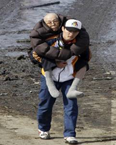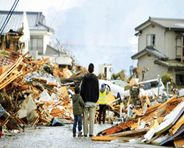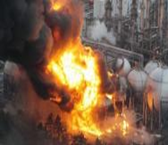Tokyo, March 11, 2011
  
| People left their houses near Sendai, northern Japan on March 11th.
A man and child look out over destroyed homes after a tsunami(海啸) and earthquake.
Nuclear crises(核危机) in Japan’s power plants(核电站).
|
|
Could it have been worse?
More than a minute before the earth under their feet began to shake, many millions of Japanese people got cell phone
alerts; TV networks interrupted (打断,中断) their broadcasts and turned to the latest announcement of Japanese government; loud speakers started suddenly to warn people of the coming tsunami; bullet trains came to a stop. The earthquake on March 11 was the first test of the nation’s earthquake early-warning technology (地震预警技术). However, in the fight of Man
vs Nature, Nature won again. Hundreds, if not thousands of people, lost their lives in Japan. Scientists believe it is the fifth-strongest quake in the world since 1900 and the most powerful on record ever to hit Japan.
Lin tells of calm survivors
When the office began to shake, his friends were calm and still working. But the shaking became stronger. People shouted at him: “Run out of the building, now!” This was Lin Jia’s first experience of an earthquake. Lin, 26, has been in Japan for three months, working as a software engineer in Shinagawa, Tokyo. Lin stayed with others in a bus station all afternoon. Buildings were shaken by a series(系列) of aftershocks. He was nervous, but the people around him were so calm and organized that he gradually (逐渐) calmed down.
小题1:What does the underlined word “alert” mean?
小题2: How many ways of earthquake early-warning are mentioned in the passage?
小题3: Which of the following is NOT true?
| A.Lin Jia has never met with an earthquake in Japan. |
| B.There have been five earthquakes in Japan since 1900. |
| C.The earthquake is the most powerful on record ever to hit Japan. |
| D.The local government warned people of the coming earthquake in some ways. |
小题4: What is the most important after an earthquake according to the article?
| A.Keep away from the nuclear power plants. |
| B.Running out of the building. |
| C.Keep calm and organized. |
| D.Get the cell phone alerts |
小题5: Where does this article probably come from?
| A.a newspaper | B.an advertisement | C.a diary | D.a novel |
